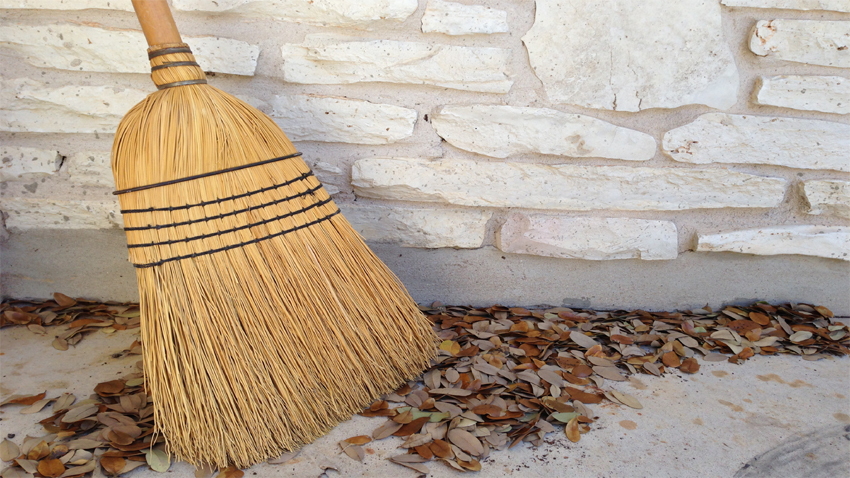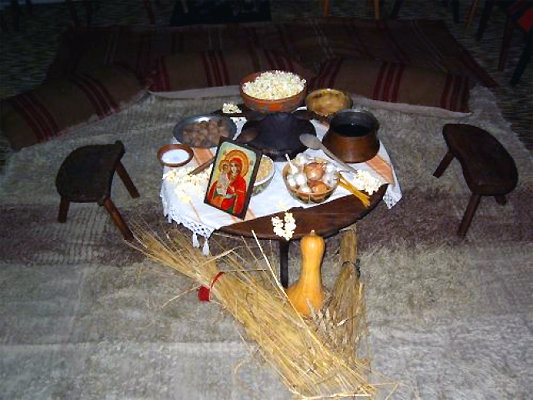“Servant in the daytime, master at night. What is it?” The answer to this popular riddle is: the broom.
The broom is regarded as a woman’s tool. With the exception of journeymen and apprentices, whose job it is to sweep the store and workshop and the street in front.  As anywhere in the world, the broom is used to sweep up the litter, its function is to make things clean, to sweep away all things unwanted and harmful and that is why it is part of tradition and of numerous rituals. It is particularly potent if it is made out of a plant called cornflower picked on Enyovden (Midsummer’s day). That is when it is said to possess the magic power to protect. That is why on Enyovden young girls and brides would gather whole armfuls of cornflower. After that the sprigs would be tied up into future brooms and left somewhere to dry. They were then used around the house. The broom used to sweep the threshing-floor was made out of sorghum, and for this reason the plant itself is called metla, mutlar or metlina, all of them words derived from the Bulgarian word for broom, metla.
As anywhere in the world, the broom is used to sweep up the litter, its function is to make things clean, to sweep away all things unwanted and harmful and that is why it is part of tradition and of numerous rituals. It is particularly potent if it is made out of a plant called cornflower picked on Enyovden (Midsummer’s day). That is when it is said to possess the magic power to protect. That is why on Enyovden young girls and brides would gather whole armfuls of cornflower. After that the sprigs would be tied up into future brooms and left somewhere to dry. They were then used around the house. The broom used to sweep the threshing-floor was made out of sorghum, and for this reason the plant itself is called metla, mutlar or metlina, all of them words derived from the Bulgarian word for broom, metla.

According to popular belief brooms could ruin any chance of a future wedding or the bond with the community. Girls must not fight using a broom or else they will remain single, so that was something strictly forbidden. Another thing not to be done was to walk around someone, broom in hand, or sweep the ground around them – people will come to hate them. If that was done to an unmarried girl, the boys would speak ill of her and she would never marry. One more thing never to be done – leap over a broom.
 Brooms are often made mention of in incantations against fright and certain diseases. It is believed brooms have the power to ward off evil spirits and other villainous beings. A newborn unbaptized baby must never be left by itself, lest evil spirits gather around. The same is true of women one week after they have given birth. If, for some reason, they do have to be left alone, a broom is placed next to them for protection. According to folk tales and beliefs, the evil beings stop to count the sprigs the broom is made out of and it takes them so long that some member of the household is bound to enter the room. Or morning would come and they would lose their powers. On Ignazhden (St. Ignatius day) – one of the most important feast days in the traditional calendar, a day when good-luck rituals are performed, brooms also play an important role. Before entering the house the polaznik – the first human or animal to enter the house – was supposed to stop behind the door and sit on the broomstick for a little while. It was believed that this broke any evil spells and in springtime the mother hens would roost the eggs until they are all hatched.
Brooms are often made mention of in incantations against fright and certain diseases. It is believed brooms have the power to ward off evil spirits and other villainous beings. A newborn unbaptized baby must never be left by itself, lest evil spirits gather around. The same is true of women one week after they have given birth. If, for some reason, they do have to be left alone, a broom is placed next to them for protection. According to folk tales and beliefs, the evil beings stop to count the sprigs the broom is made out of and it takes them so long that some member of the household is bound to enter the room. Or morning would come and they would lose their powers. On Ignazhden (St. Ignatius day) – one of the most important feast days in the traditional calendar, a day when good-luck rituals are performed, brooms also play an important role. Before entering the house the polaznik – the first human or animal to enter the house – was supposed to stop behind the door and sit on the broomstick for a little while. It was believed that this broke any evil spells and in springtime the mother hens would roost the eggs until they are all hatched.
A ritual figure, part of a local tradition called German is made out of a broom – this has the opposite effect to the ritual for invoking rain. In the region of Pleven where there is much rain which damages the crops, a German is made to ward off rain. Unmarried girls would purloin a broom from one of the houses, wrap it up in rags, while the broomstick depicts a human head.
The broom of the unmarried girls has a special place in songs and popular poetry. The girls use it to “sweep the flat yard” so they can welcome their beloved who will bring the in-laws to the house, or who is coming to take her away to elope with him. Brooms are mentioned in a number of proverbs, but there is one that is particularly popular: A new broom sweeps as clean as a whistle, but an old broom knows all the corners.
English version: Milena Daynova
It's Ignazhden! On St Ignatius' Day, 20 December, we honour the memory of St Ignatius the Theophorus. In the Bulgarian calendar St Ignatius' Day (Ignazhden) is not only a religious but also a folklore holiday. According to national tradition, it is..
Eight authentic Bulgarian traditions and skills, passed down through generations, have been added to the National Representative List of Bulgarian Intangible Cultural Heritage of Humanity, becoming part of Bulgaria's Living Human Treasures. "This..
Halva, this sweet temptation with an oriental twist, is a welcome delicacy on the Bulgarian table, especially on holidays. Judging by the descriptions of Western travellers, halva was a common dessert in Bulgarian lands as early as the 16th century. The..
Every holiday has its own flavour, its own 'clothes' and its own tunes. Christmas is no different. "Little is known about traditional Bulgarian carols and..

+359 2 9336 661
